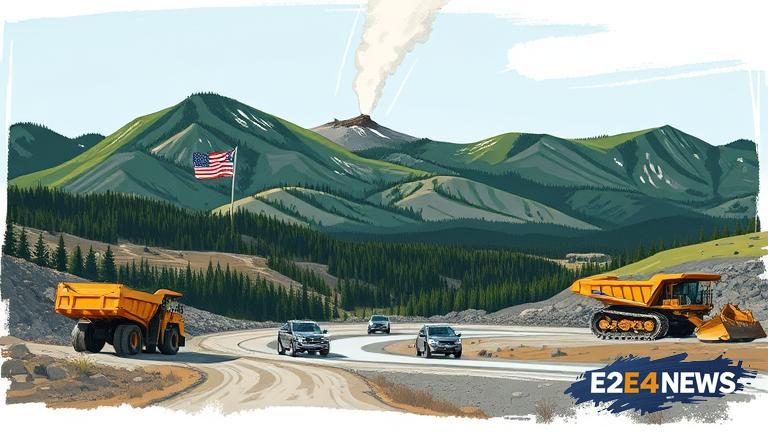The Montana mining industry has been a significant contributor to the state’s economy for decades, with a rich history of extracting valuable minerals such as copper, gold, and silver. However, in recent years, the industry has faced numerous challenges, including declining commodity prices, increased environmental regulations, and concerns over the impact of mining on local communities. Despite these challenges, the industry is experiencing a surge in demand for critical minerals, such as lithium and rare earth elements, which are essential for the production of renewable energy technologies and advanced electronics. The demand for these minerals is driven by the growing need for clean energy and the increasing use of electric vehicles. As a result, mining companies are investing heavily in new projects and technologies to extract these minerals in a sustainable and responsible manner. One of the major challenges facing the industry is the need to balance economic development with environmental protection. Mining operations can have significant impacts on local ecosystems, including water pollution, habitat destruction, and soil erosion. To address these concerns, mining companies are implementing new technologies and practices, such as reclamation and rehabilitation of mined lands, to minimize their environmental footprint. Additionally, regulatory agencies are working to ensure that mining operations are conducted in a safe and responsible manner, with strict guidelines and enforcement mechanisms in place. The Montana Department of Environmental Quality is responsible for overseeing the state’s mining industry, and has implemented a range of measures to protect the environment and public health. These measures include requirements for environmental impact assessments, permitting, and monitoring of mining operations. Despite these efforts, there are still concerns over the impact of mining on local communities, including the potential for water pollution, noise pollution, and displacement of residents. To address these concerns, mining companies are engaging with local communities and stakeholders to ensure that their operations are transparent and accountable. This includes providing information on mining plans, conducting public outreach and education programs, and establishing community liaison offices. Furthermore, the industry is working to promote sustainable mining practices, including the use of renewable energy, reducing water consumption, and implementing circular economy principles. The Montana mining industry is also playing a critical role in the state’s economic development, with mining operations generating significant revenue and creating jobs. According to the Montana Mining Association, the industry generates over $1 billion in economic activity each year, and supports over 5,000 jobs. The industry is also contributing to the state’s tax base, with mining companies paying millions of dollars in taxes and royalties each year. In addition to the economic benefits, the Montana mining industry is also playing a critical role in the state’s energy security, with mining operations providing essential minerals for the production of renewable energy technologies. As the demand for these minerals continues to grow, the industry is expected to play an increasingly important role in the state’s energy future. Overall, the Montana mining industry is facing a range of challenges and opportunities, from environmental concerns and regulatory hurdles to growing demand for critical minerals and economic development. As the industry continues to evolve and adapt to these challenges, it is likely to remain a significant contributor to the state’s economy and energy security for years to come. The industry’s commitment to sustainable mining practices, community engagement, and environmental protection will be critical to its long-term success. With the right policies and regulations in place, the Montana mining industry can continue to thrive, while also protecting the state’s natural resources and promoting economic development. The future of the industry will depend on its ability to balance economic development with environmental protection, and to promote sustainable mining practices that benefit both the industry and local communities. As the industry moves forward, it will be important to continue to monitor and address the environmental and social impacts of mining operations, and to ensure that the benefits of mining are shared equitably among all stakeholders. By working together, the Montana mining industry, regulatory agencies, and local communities can ensure that the industry remains a vital part of the state’s economy and energy security, while also protecting the state’s natural resources and promoting sustainable development.
